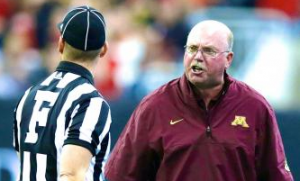 University of Minnesota Golden Gophers Head Football Coach Jerry Kill has epilepsy, and apparently is particularly prone to having seizures in hot and stressful situations. It’s obviously not his fault. But epilepsy does make it difficult to do some jobs, such as those involving live performances on hot stressful stages. For instance, it would be difficult for someone prone to regular stress-induced seizures to be a stage actor at the Guthrie Theater.
University of Minnesota Golden Gophers Head Football Coach Jerry Kill has epilepsy, and apparently is particularly prone to having seizures in hot and stressful situations. It’s obviously not his fault. But epilepsy does make it difficult to do some jobs, such as those involving live performances on hot stressful stages. For instance, it would be difficult for someone prone to regular stress-induced seizures to be a stage actor at the Guthrie Theater.
Division I FBS college football is a big time performance with tens of thousands of screaming fans in the stadium, and millions more on TV. Fans and commercial sponsors want an uninterrupted stream of football action. So unfortunately, Jerry Kill has one of those careers that doesn’t fit all that well with this disease. When Coach Kill has a seizure, it disrupts the performance that is the source of his large paycheck. If you have a lot of seizures disrupting a lot of performances, that starts to become a legitimate issue. The seizures also raise concerns for the elite athletes the University desperately needs to attract in order to rebuild the Gophers’ program.
Still, I hope the University doesn’t replace Jerry Kill because of this issue. Time will tell, but Kill looks to be an effective coach for a program that desperately needs both an effective coach and coaching continuity. But to make it work for Kill, the University may have to make an accommodation, and Kill may have to accept an adjusted role that isn’t precisely what he prefers.
Head Coach, But Not Head Sidlines Coach
Coach Kill and Gophers Athletic Director Norwood Teague should agree to a new coaching model that looks something like this:
First, give Kill the title Head Coach, and give one of his top assistants the title of Head Sidelines Coach. Then have Head Coach Kill work in a climate controlled stadium suite during games, managing the big picture of the game, while the Head Sidelines Coach manages, with some consultation with the Head Coach, hectic stress-inducing tasks like communications with the referee, calling timeouts, challenging penalties, clock management, and real time feedback to players.
The University has every right to ask Coach Kill to do everything he can to manage his disease, and accepting a revised role like this would be one important thing he can do to manage his disease.
There would be several advantages to this kind of approach:
- STABILIZES GAME MANAGEMENT. First, the power-sharing arrangement would give players, potential recruits, and fans confidence that the Gophers’ game management is secure and stable. I wish Coach Kill weren’t in this position, but game management is a legitimate concern when you have a lead game manager who has regular heat- and stress-induced seizures. With this kind of revised role for Kill, fewer games would be disrupted. For recruits who think to themselves “Coach Kill seems like a great guy and coach, but all of those mid-game seizures are destabilizing for this program,” this power-sharing model shows them that they can get both Jerry Kill and stable game management at the University of Minnesota. It addresses both the real and perceived problem the Gophers program currently faces.
- KEEPS KILL WITH THE GOPHERS. Importantly, this plan would keep Coach Kill adding tremendous value at the University. Kill is a talented and likeable football coach who seems to be making slow, steady progress rebuilding this troubled football program. Arguably, 90% of his contributions to the University of Minnesota football program happen outside of the glare of the game day spotlight – in practices, game planning meetings, personnel management, recruiting visits, film study, and public appearances. So, it makes sense to scale back the most stressful 10% of his duties in order to keep him available to deliver 90% of the value he currently brings. If Coach Kill is regularly having seizures during games, there probably will come a time when the Gophers will reluctantly have to go with a different head coach. That would hurt both the University and Kill, so both sides should make a proactive move to prevent it.
- BETTER MANAGES KILL’S HEALTH. Most importantly, this kind of role would be better for Kill’s health. Being in a climate controlled setting with fewer stressful game time duties would reduce the number of seizure triggers, and therefore, one would hope, the number of seizures Kill suffers. That’s good for both the Gophers program and Kill.
It’s too simplistic for Kill supporters to say “epilepsy is a disease, therefore it’s discriminatory to judge him based on the implications of his disease.” It’s equally simplistic to say “there’s no role for epileptics in big time college football.” There’s a role for a talented epileptic coach like Jerry Kill, but it may not be the exact role played by other Head Coaches. There’s a happy medium here, and I hope Teague and Kill can find it.
– Loveland
